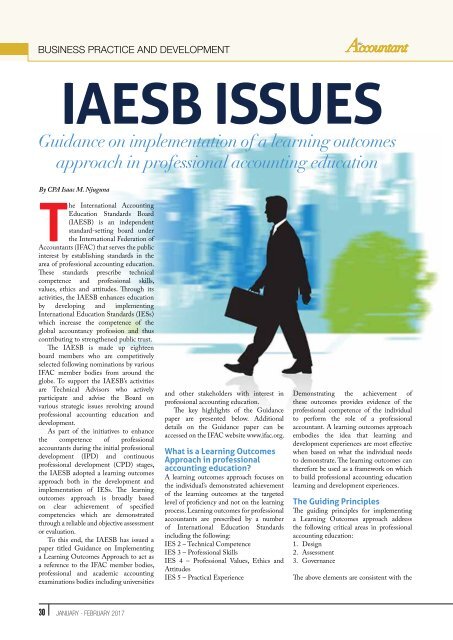The Accountant-Jan-Feb 2017
Create successful ePaper yourself
Turn your PDF publications into a flip-book with our unique Google optimized e-Paper software.
Business Practice and Development<br />
IAESB ISSUES<br />
Guidance on implementation of a learning outcomes<br />
approach in professional accounting education<br />
By CPA Isaac M. Njuguna<br />
<strong>The</strong> International Accounting<br />
Education Standards Board<br />
(IAESB) is an independent<br />
standard-setting board under<br />
the International Federation of<br />
<strong>Accountant</strong>s (IFAC) that serves the public<br />
interest by establishing standards in the<br />
area of professional accounting education.<br />
<strong>The</strong>se standards prescribe technical<br />
competence and professional skills,<br />
values, ethics and attitudes. Through its<br />
activities, the IAESB enhances education<br />
by developing and implementing<br />
International Education Standards (IESs)<br />
which increase the competence of the<br />
global accountancy profession and thus<br />
contributing to strengthened public trust.<br />
<strong>The</strong> IAESB is made up eighteen<br />
board members who are competitively<br />
selected following nominations by various<br />
IFAC member bodies from around the<br />
globe. To support the IAESB’s activities<br />
are Technical Advisors who actively<br />
participate and advise the Board on<br />
various strategic issues revolving around<br />
professional accounting education and<br />
development.<br />
As part of the initiatives to enhance<br />
the competence of professional<br />
accountants during the initial professional<br />
development (IPD) and continuous<br />
professional development (CPD) stages,<br />
the IAESB adopted a learning outcomes<br />
approach both in the development and<br />
implementation of IESs. <strong>The</strong> learning<br />
outcomes approach is broadly based<br />
on clear achievement of specified<br />
competencies which are demonstrated<br />
through a reliable and objective assessment<br />
or evaluation.<br />
To this end, the IAESB has issued a<br />
paper titled Guidance on Implementing<br />
a Learning Outcomes Approach to act as<br />
a reference to the IFAC member bodies,<br />
professional and academic accounting<br />
examinations bodies including universities<br />
and other stakeholders with interest in<br />
professional accounting education.<br />
<strong>The</strong> key highlights of the Guidance<br />
paper are presented below. Additional<br />
details on the Guidance paper can be<br />
accessed on the IFAC website www.ifac.org.<br />
What is a Learning Outcomes<br />
Approach in professional<br />
accounting education?<br />
A learning outcomes approach focuses on<br />
the individual’s demonstrated achievement<br />
of the learning outcomes at the targeted<br />
level of proficiency and not on the learning<br />
process. Learning outcomes for professional<br />
accountants are prescribed by a number<br />
of International Education Standards<br />
including the following:<br />
IES 2 – Technical Competence<br />
IES 3 – Professional Skills<br />
IES 4 – Professional Values, Ethics and<br />
Attitudes<br />
IES 5 – Practical Experience<br />
Demonstrating the achievement of<br />
these outcomes provides evidence of the<br />
professional competence of the individual<br />
to perform the role of a professional<br />
accountant. A learning outcomes approach<br />
embodies the idea that learning and<br />
development experiences are most effective<br />
when based on what the individual needs<br />
to demonstrate. <strong>The</strong> learning outcomes can<br />
therefore be used as a framework on which<br />
to build professional accounting education<br />
learning and development experiences.<br />
<strong>The</strong> Guiding Principles<br />
<strong>The</strong> guiding principles for implementing<br />
a Learning Outcomes approach address<br />
the following critical areas in professional<br />
accounting education:<br />
1. Design<br />
2. Assessment<br />
3. Governance<br />
<strong>The</strong> above elements are consistent with the<br />
30 JANUARY - FEBRUARY <strong>2017</strong>

















